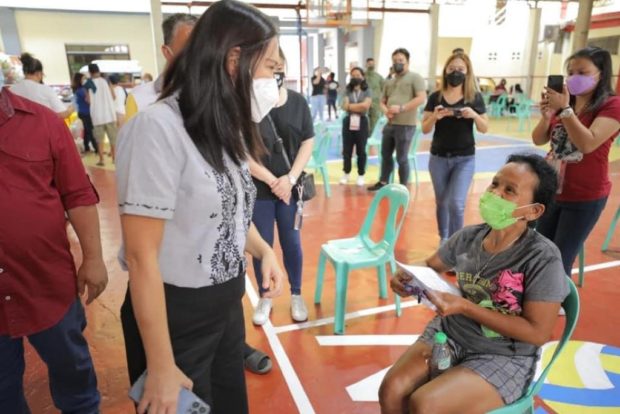
QC Mayor Joy Belmonte visits several free antigen testing sites. Contributed photo
MANILA, Philippines — The Quezon City government strengthened its City Epidemiology and Disease Surveillance Unit (CESU) to cope with the volume of individuals who wish to learn their COVID-19 status at the soonest possible time for immediate action.
Mayor Joy Belmonte says increasing CESU’s capacity to test will allow faster detection of cases, prevent the virus from spreading, and respond to the needs of QCitizens accordingly.
“Timely confirmation of the virus’ presence is essential, especially given the upsurge in cases. More than ever we must think of our priority sectors such as senior citizens and those with comorbidities, who rely on speedy test results in order to receive immediate and appropriate medical care,” added Belmonte.
Mayor Joy Belmonte with the health workers at a free antigen testing site. Contributed photo
The LGU has now established a total of seventeen (17) community-based testing centers (CBTs) , strategically located in each congressional district to accommodate and identify more infected residents.
In District 1, the sites are Toro Hills Basketball Court at Barangay Bahay Toro; and Barangay Sta. Teresita Health Facility at Barangay Sta. Teresita.
In District 2, the sites are Melencio Castelo Training Center at Barangay Commonwealth; Talanay A3 Covered Court at Barangay Batasan Hills; and 5 Faustino St., at Barangay Holy Spirit.
For District 3, the sites are Old Balara Annex Court at Barangay Old Balara; 157 Barangay Quirino 2B; and Kalantiaw Elementary School at Barangay Bagumbuhay.
For District 4 the sites are Amoranto Sports Complex at Barangay Paligsahan; 10 Granada St., at Barangay Valencia; and Baluyot Court at Barangay Krus na Ligas.
For District 5 the sites are SB Plaza at Barangay Novaliches Proper; HB Bistekville Park 6 at Barangay Fairview; and San Bartolome Elementary School at Barangay San Bartolome.
And For District 6 the sites are Talipapa Senior High School at Barangay Talipapa; and HB Park Emerald St., at Barangay Pasong Tamo.
QC Mayor Joy Belmonte in one of her visits at a free antigen testing site. Contributed photo
Lastly, the QC Xperience (QCX) Museum located at the Quezon Memorial Circle, Elliptical Road has also been turned into a testing center.
According to QCESU Chief Dr. Rolando Cruz, the city recently beefed up its testing capacity with 100,000 rapid antigen test kits and continued collaboration with the Philippine National Red Cross for the expanded allocation of RT-PCR test kits.
“CESU-initiated testing centers have been operating since last year offering free testing to mostly symptomatic, close contacts and persons needing hospitalization as part of protocol. Each testing center is equipped with swab booths and can accommodate between 100 and 200 individuals per day,” said Cruz. He also reminds QCitizens to book their appointments through the online as walk-ins are not entertained.
In addition to these permanent community-based testing centers, CESU has also partnered with councilors, congressmen and philanthropists in order to conduct free rapid antigen testing in different communities daily.
Meanwhile, as part of efforts to contain the spread of COVID-19 in workplaces and ensure the safety of workers, the city government continues to conduct active surveillance in different public or private offices and agencies in the city.
Under Kyusi-Industriya I.W.A.S (Industry-Wide Active Surveillance) sa COVID-19, CESU offers free routine swab testing to thousands of employees.
This January, CESU is scheduled to test more than 1,500 employees from agencies and private companies such as the Office of the Ombudsman, the Department of Social Welfare and Development, and Toyota Fairview and Commonwealth among others.
“Testing, both for diagnosis and for surveillance, remains our best defense. This allows us to instantly look after our affected citizens while aiding us to plan more efficient and responsive interventions to potential outbreaks,” said Cruz.